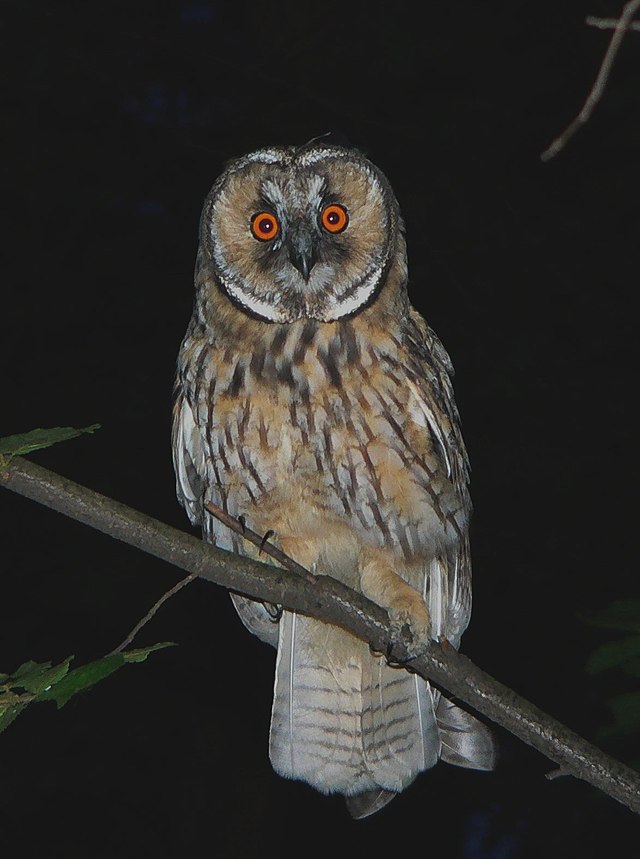Loading AI tools
Person who tends to stay awake at night From Wikipedia, the free encyclopedia
A night owl, evening person or simply owl, is a person who tends or prefers to be active late at night and into the early morning, and to sleep and wake up later than is considered normal; night owls often work or engage in recreational activities late into the night (in some cases, until around dawn), and sleep until relatively late in the day. People with Delayed Sleep Phase Syndrome are often described as night owls.
This article has multiple issues. Please help improve it or discuss these issues on the talk page. (Learn how and when to remove these messages)
|

The opposite of a night owl is an early bird – a lark as opposed to an owl – which is someone who tends to begin sleeping at a time that is considered early and also wakes early. Researchers traditionally use the terms morningness and eveningness[1] for the two chronotypes or diurnality and nocturnality in animal behavior. In several countries, especially in Scandinavia, one who stays up late is called a B-person, in contrast to an early riser being called an A-person.[2][3]
While staying up after dark was considered a negative trait, this changed in 17th and 18th century Europe (and subsequently spread beyond) due to the development and implementation of artificial lighting: more domestic lights, added street lighting, and adaptation by the royal and upper social classes.[4] The introduction of chocolate, coffee and tea, and cafes that stayed open through dawn, became part of the new culture.[4]

The term is derived from nocturnal habits of owls.[5] Most owls sleep during the day and hunt for food at night.
Usually, people who are night owls stay awake past midnight, and extreme night owls may stay awake until just before or even after dawn.[6]
Some night owls have a preference or habit for staying up late, or stay up to work the night shift. Night owls who work the day shift often have difficulties adapting to standard daytime working hours.
Night owls have often been blamed for unpunctuality or attitude problems.[7] Employers, however, have begun to learn to increase productivity by respecting body clocks through flexible working hours,[8] while the Danish "B-Society" of night owls[7] and the American Start School Later movement advocate more school and workplace flexibility for the post-agricultural world.[7]
Some research has found that night owls are more intelligent and creative and more likely to get high-paying jobs than larks, or morning persons. A study among 1,000 adolescents by the University of Madrid found that night owls scored higher than early birds on inductive reasoning tests, which often serve as a proxy for intelligence.[9] However, they lag behind larks in academic performance,[10] and they tend to have unhealthier eating habits, as well as higher rates of smoking.[11]
Some night owls who have great difficulty adopting desired sleeping and waking times may have delayed sleep phase disorder. Morning light therapy may help to shift sleep rhythms for the night owl.[12]
The night-owl pattern is more prevalent in men than in women.[13] Night-owls are more likely to be single than in long-term relationships.[13] A study done in 2013 suggests that they also more commonly possess dark triad traits.[14]
The tendency to be a night owl exists on a spectrum, with most people being typical, some people having a small or moderate tendency to be a night owl, and a few having an extreme tendency to be a night owl.[15] An individual's own tendency can change over time and is influenced by multiple factors, including:
The genetic make-up of the circadian timing system underpins the difference between early and late chronotypes, or early birds and night owls.[16] While it has been suggested that circadian rhythms may change over time, including dramatic changes that turn a morning lark to a night owl or vice versa,[17][18] evidence for familial patterns of early or late waking would seem to contradict this, and individual changes are likely on a smaller scale.[19]
A 2007 survey of over 55,000 people found that chronotypes tend to follow a normal distribution, with extreme morning and evening types on the far ends.[20]
Night owls tend to thrive in careers that do not require working in the early morning. People who want to work in the evening are often employed at restaurants, hotels, entertainment venues, retail stores, and some personal care businesses.[21] Night owls who work the night shift may work in emergency services, in transportation, or at round-the-clock facilities, such as hospitals and some manufacturing plants.[21]
Many businesses that operate in the evening or at night need employees at all levels, from entry-level employees to managers to skilled staff, whenever they are open. For example, most hospitals employ many types of workers around the clock:
Industries that tend to be less favorable to night owls include farming, construction, education, and public utilities. Many employees in these industries start work before 7:00 a.m.[21]
A list of famous night owls includes:
So we'll go no more a roving
So late into the night
Though the heart be still as loving
And the moon be still as bright.
Seamless Wikipedia browsing. On steroids.
Every time you click a link to Wikipedia, Wiktionary or Wikiquote in your browser's search results, it will show the modern Wikiwand interface.
Wikiwand extension is a five stars, simple, with minimum permission required to keep your browsing private, safe and transparent.